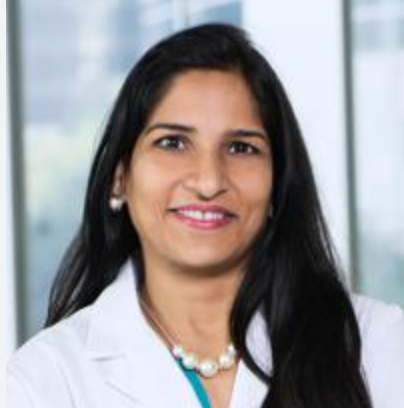Protecting Your Liver: Insights from Sudha Kodali, MD
Sudha Kodali, MD, stresses the need for routine liver screenings for individuals with obesity, diabetes or a family history of liver disease.
By
Lana Pine
| Published on October 24, 2024
4 min read
Sudha Kodali, MD
Credit: Houston Methodist

In an interview with The Educated Patient, Sudha Kodali, MD, a specialist of Hepatology and Transplant Hepatology at Houston Methodist, discusses key risk factors and preventive measures for liver disease. She highlights that obesity and excess weight have become major health concerns in the United States, contributing to metabolic dysfunction-associated steatotic liver disease (MASLD).
Kodali also stresses the importance of early detection to prevent serious complications such as cirrhosis and liver cancer. She explains that excess weight can cause fat accumulation in the liver, leading to inflammation and scarring, and emphasizes lifestyle changes such as weight loss, a balanced diet and limiting alcohol to reverse fatty liver. Additionally, she advises against unregulated herbs and supplements that are not regulated and can be unsafe because of certain ingredients that may be toxic to the liver, staying hydrated and getting enough sleep to protect liver health.
What are some key risk factors for liver disease that people should be aware of?
SK: Everyone should be aware of the fact that obesity and excess weight has become one of the fastest-growing health challenges in the United States, affecting more than 100 million people—a staggering 30.5% increase since 2000. In addition, there are also certain medical risk factors like diabetes, high cholesterol and moderate to heavy alcohol use, as well as infections like hepatitis B and C.
The American Liver Foundation (ALF) is offering a quick quiz to help people determine if they’re at risk for liver disease. What are some of the key indicators that the quiz looks for, and why is early detection so important?
SK: If you have a history of abnormal liver labs or elevated liver enzymes, regular alcohol use, as well as medical risk factors like diabetes, high cholesterol and long-standing blood pressure issues. Early diagnosis is the key to preventing long-term complications like cirrhosis and liver cancer.
What are some signs people should look out for to catch liver disease early, and what routine screenings are recommended?
SK: Liver disease can be screened by a combination of labs and ultrasounds. If one is overweight or has long standing or uncontrolled diabetes, they should ask their doctor to screen for liver issues. Having a family history of liver disease also increases the risk of certain liver conditions.
There is a strong link between obesity and liver disease. How does excess weight affect liver function, and what lifestyle changes can help improve liver health?
SK: Obesity can cause nonalcoholic or metabolic associated fatty liver which is fat accumulation in the liver that can cause inflammation and scarring in the liver. It is normal for the liver to contain some fat. However, if 5 to 10% of the liver’s weight is fat, then it is called a fatty liver (steatosis). Over time this fat accumulation in the liver can cause cirrhosis.
Lifestyle changes like maintaining a healthy weight and losing 5-10% of body weight can help reverse fat and fat-related inflammation in the liver. In addition to eating a well-balanced diet, monitoring caloric intake and minimizing alcohol can also help to improve liver health.
Besides a healthy diet and regular exercise, what other steps can individuals take to protect their liver health?
SK: To protect your liver you should avoid herbs and supplements, minimize alcohol use, get adequate sleep, plenty of hydration and get vaccinated for hepatitis A and B.

